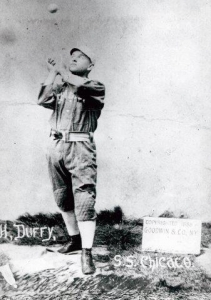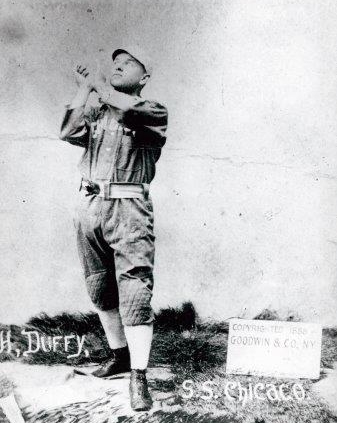October 11, 1898: Relieved Beaneaters gain National League title again

As the skies darkened over the nation’s capital, the spirit of the brave sportsmen from Boston brightened. The scoreboard-watching Beaneaters breathed easier when the young man serving as scoreboard operator removed the 12-by-16-inch placard noting the innings.
The temporary gap caused players to pause. Beaneaters players elbowed each other and stared. Then an “F” appeared. The game over. Stunned, many in the dugout wondered, could this be? The second game of the Baltimore-New York Giants doubleheader had gone final, the game cut short by darkness and Baltimore on the losing end of the abbreviated six-inning contest, 6-2.
A sense of relief filled the air. All the Boston team needed was to maintain the lead in their game. A victory against the Senators would clinch a Boston pennant for the second straight year. The ultimate prize dangled well within reach. Although they led through three innings, the Beaneaters’ margin was tenuously narrow – just two runs.
As the season barreled toward conclusion, there was a collective recollection of the prior year’s late-September series between the two dynasties. The 1897 games, filled with anger and fistfights, perhaps haunted team captain Hugh Duffy. The Beaneaters controlled their destiny. Without a postseason tournament, the team that finished first in the regular season was crowned champion.
The game in Washington had been close to that point. The Nationals elected to bat first and leadoff batter Jake Gettman, the center fielder, singled to left-center. He ran all the way to third base on a wild pitch, and scored on Kip Selbach’s fly ball to Duffy in left field. It was 1-0, Washington.
Boston came back with two runs in the first, and another one in the bottom of the second. The score stood 3-1 after the first three innings.
A collective burst of energy emerged, as the close game was broken apart in the top of the fourth. The visitors’ relentless lineup, which featured three future Hall of Famers – third baseman and league-leading home-run hitter Jimmy Collins, and outfielders Duffy and Billy Hamilton – took over the game. Boston pounded nine runners across home plate in the frame. Ted “Parson” Lewis, an afterthought to a rotation that included Hall of Famers Charles Augustus “Kid” Nichols and Vic “The Delaware Peach” Willis, kept the Nationals from scoring until the top of the seventh, but Boston added one run in the seventh and another in the eighth.
The game did not end without a late show of life. In the ninth inning, playing in notably dark conditions, Washington’s Jud Smith and Duke Farrell got things started with base hits. Both were plated by a screaming line drive that cleared the head of a frantically racing Hamilton. Gettman made the last out. A hard hit sent the ball to shortstop Herman Long, who knocked it down and made the routine toss to first baseman Fred Tenney. Many fans in Washington were happy the season ended. The 55-101 Senators had performed like an imitation of a baseball club.1
The steady pitching of Lewis held the Senators to five runs on seven hits; in the process he captured his 26th win of the season. Lewis increased his league-leading winning percentage to .765, an exclamation point to the finest season of his professional career. In the end the Beaneaters dominated in every phase of the game, soundly thumping the Senators, 14- 5.
Boston’s formidable lineup victimized Kirtley Baker with a 20-hit assault including four doubles and two triples.2 Each starter collected at least two hits except weak-hitting backup catcher George Yeager, who went hitless. Tenney led the way with four hits, including a triple.3 Sliding Billy Hamilton and Collins followed with three hits apiece. Hamilton swiped a base and led Boston with three runs scored.
It was the next-to-last home game of the season in Washington, and ladies’ day, but, fed up with the home team’s incompetence, fans shouted obscenities and other caustic remarks from the stands. One fan quipped, “Say, dose fellas wouldn’t never be run in for playing base ball.”4 The fans had plenty to jeer about. Although the home team scorer charged the inept Senators with seven miscues, fans doubted the accuracy. The legitimacy of five or six other balls marked as hits raised questions and eyebrows. Indeed, both box scores from the Boston Journal’s W.S. Barnes Jr.’s and the Boston Globe’s Tim Murnane showed 11 errors for Washington.5 All in all, the Evening Star of Washington called it “about as sorry a spectacle as could be imagined.”6
The Times of Washington dubbed it “an atrocious burlesque,” writing, “The local boys could not have hit a watermelon with a base [sic] fiddle; so far as fielding was concerned, they could not have stopped a rolling pumpkin with a dog catcher’s net. … Among the infielders it appeared to be a contest as to which one could outshine the others in rank mishaps.”7 The Times box score showed 10 errors for Washington. There was no disagreement over the final score.
Although the Beaneaters hit Baker’s offerings all over the field, team malaise did contribute to the one-sidedness of the affair. During the ignominious fourth inning, the Beaneaters did manage to pound out seven hits, but thanks to the abysmal performances of Frank Gatins, Doc Casey, and Jud Smith, five other hitters got on base through fielding lapses. The trio played as though they desired a very short afternoon. The sole error for Boston was captain Duffy’s miscue on a catchable soft fly.
The game took two hours.
When the final out was recorded the curtain closed on a very disappointing campaign for Washington. For the Beaneaters, smiles finally emerged. The team had endured another season-long bitter battle with Baltimore. Unlike the nasty final stretch of 1897, this year the team was more entangled with each other throughout the heat of the race. Duffy and other players repeated their motto, “All is forgiven.” Winning does cover plenty of sins.
And win the Beaneaters did — winning 18 of 21 as the season closed. Handshakes, hugs, and admiration abounded. There were, however, “no antics and no shouts of triumph. It was more a spirit of contentment that pervaded the Boston camp.” One player, who was unnamed, averred, “Now we would be happy, if a good-sized check came our way.”8
Duffy commented, “I think Boston had the greatest team ever organized.”9 The pitching trio, led by Nichols, Willis, and Lewis combined for 82 wins. For Nichols, with 31, it was his third straight year earning 30 or more victories.
The 152 games Boston played in 1898 were 17 games more than in 1897.
The dean of Boston sportswriters, Tim Murnane, commented, “No ball team ever played more earnestly than Boston did this season, and the victory is one more argument for clean, honest baseball. It is a victory that should make New England proud of [Frank] Selee and his men.”10
Notes
1 Though the team name was formally the Nationals, newspapers in both Washington and Boston called them the Senators.
2 Some accounts have 19 total hits.
3 Some accounts have two hits.
4 “Boston Is Secure,” Washington Evening Star, October 12, 1898: 7.
5 W.S. Barnes Jr., “Champions,” Boston Journal, October 12, 1898: 7.
6 “Boston Is Secure.”
7 “A Baseball Burlesque,” Times (Washington DC), October 12, 1898: 9.
8 Barnes.
9 T.H. Murnane, “Boston Again Champion,” Boston Globe, October 12, 1898: 9.
10 Ibid.
Additional Stats
Boston Beaneaters 14
Washington Nationals 5
Boundary Field
Washington, DC
Corrections? Additions?
If you can help us improve this game story, contact us.


